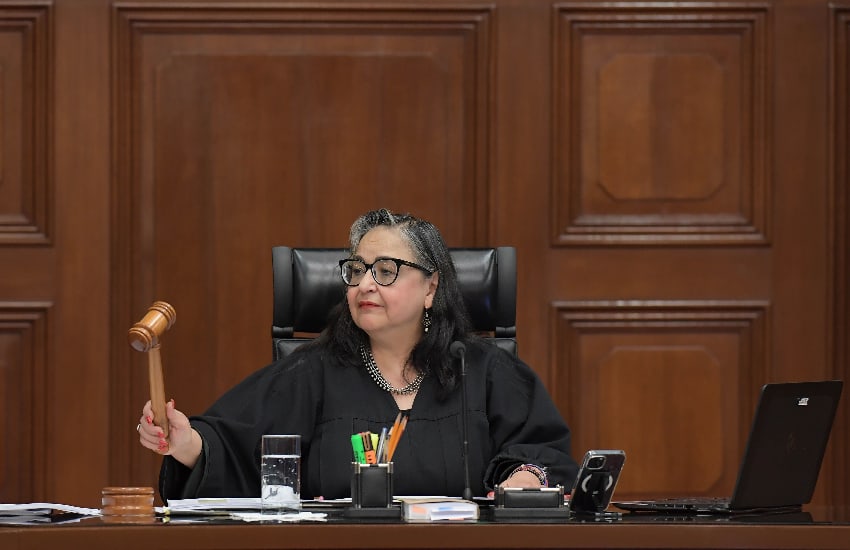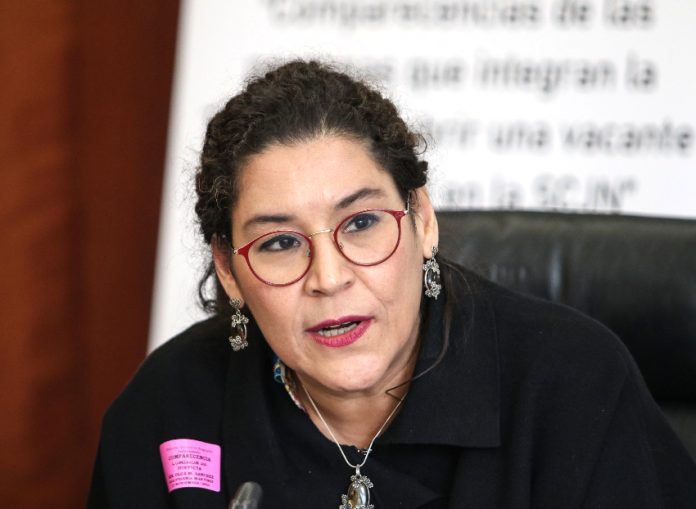President López Obrador on Thursday designated a member of the ruling Morena party as Mexico’s newest Supreme Court (SCJN) justice, hand-picking Lenia Batres Guadarrama for the role.
It was the first time in Mexican history that a president directly appointed a SCJN justice, an occurrence that was permitted because the Senate on two occasions failed to endorse any of the candidates put forward by López Obrador.
The designation and swearing in of Batres — a former federal deputy and chair of López Obrador’s executive legal advisory council until Thursday — came after she and two other women failed to attract two-thirds support among senators in a vote held in the early hours of Thursday morning.
The 54-year-old sister of Mexico City Mayor Martí Batres received the most votes out of three candidates on the president’s short list — 54 out of 121 votes cast — but that number was well short of the qualified majority required for the Senate’s appointment of a Supreme Court justice.
Morena and its allies have a simple majority in the Senate, but not the two-thirds majority required to approve changes to the constitution, or in this case, appoint a Supreme Court justice. Talks the ruling party held with the Citizens Movement party failed to yield an agreement that would have allowed the Senate to make the appointment.
López Obrador said on Friday that he met with Lenia Batres and Bertha María Alcalde Luján, another of his nominees, before he appointed the former as a Supreme Court justice.

“I said to them, what are we going to do? Help me,” he told reporters at his morning news conference.
“How are we going to do it? We’re talking about 15 years of guaranteed work,” López Obrador said, recounting the meeting.
He said that Alcalde — sister of federal Interior Minister Luisa María Alcalde — noted that she won a first vote in the Senate, but acknowledged that Batres prevailed in subsequent ones.
According to López Obrador, Bertha Alcalde then said that she had “no problem” with Batres being appointed as a SCJN justice and that she could “help” in other areas.

“I didn’t do it, but I felt like standing up and hugging her. In other words, [it was] an act of dignity, of exceptional, extraordinary principles,” López Obrador said, adding that there are people who “fight tooth and nail” for lesser positions.
“And that’s why Lenia was the proposal. … That’s the way it was and now she’s a justice,” he said.
Batres has two law degrees, including a master’s in criminal law, but no experience as a judge.
For a newly-appointed SCJN justice, that’s not unprecedented, according to Luis Eliud Tapia, a legal consultant at the Washington D.C.-based global criminal justice watchdog Fair Trials.
In fact, “it’s a good idea for people without a judicial career to be on the Supreme Court, as long as they’re independent and impartial,” he told Courthouse News.
However, Batres’ independence and impartiality have been questioned because she is a member of the party founded by López Obrador, has worked with him (including when he was mayor of Mexico City in the early 2000s), and “openly expressed loyalty to the president and his project to transform Mexico,” according to Courthouse News.

López Obrador — who asserts that there is no corruption, nepotism or cronyism in his government — is “leaving behind people who will be loyal to him,” said José Antonio Crespo, a prominent Mexican political scientist.
Batres is the fifth Supreme Court justice to be appointed since the current federal government took office in late 2018. The previous four were nominated by López Obrador on three-person shortlists, but not directly appointed by him.
The court’s chief justice is currently Norma Lucía Piña Hernández, the first woman to occupy that position.
During his presidency, López Obrador has been an outspoken critic of the Mexican judiciary, including the SCJN, which this year handed down rulings against the government’s transfer of control over the National Guard from the civilian Security Ministry to the Defense Ministry, its electoral reform package and a 2021 presidential decree that protected government infrastructure projects from legal challenges.
The president has been especially critical of Piña, and has claimed that two of the justices appointed during his term, Margarita Ríos Farjat and Juan Luis González Alcántara, “have betrayed” his political agenda.
The appointment of Batres comes after Arturo Zaldívar, a former chief justice, announced last month that he was resigning to join the presidential campaign of Claudia Sheinbaum, who will represent Morena in the June 2, 2024 election.
Five of the Supreme Court’s justices are now women, while the other six are men.
Before he leaves office next year, López Obrador hopes to get a constitutional change through Congress that would allow citizens to directly elect Supreme Court justices and other judges.
With reports from El Economista, El País and Courthouse News
